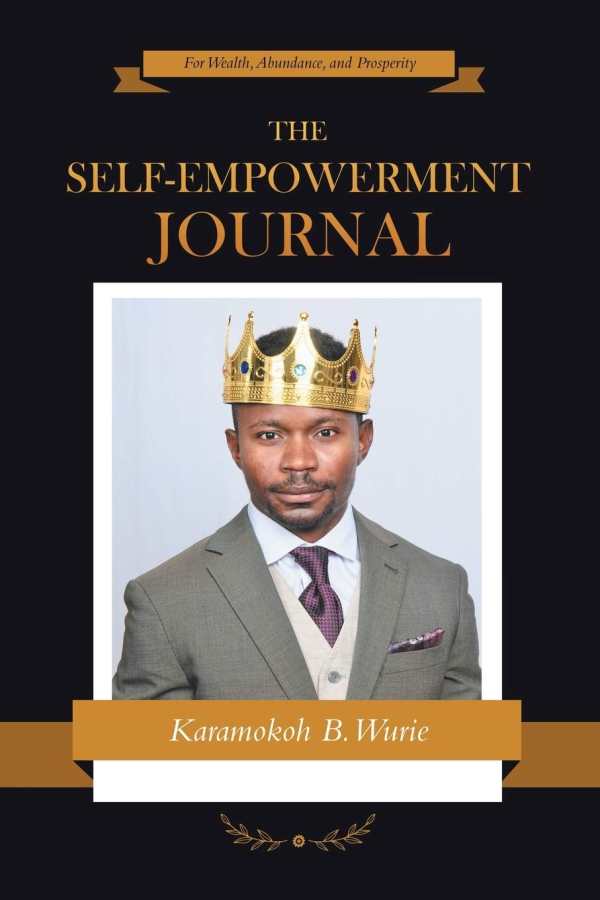The Self-Empowerment Journal
The Self-Empowerment Journal is an appealing motivational text whose optimism and sense of surety are contagious.
Karamokoh B. Wurie’s encouraging The Self-Empowerment Journal centers its notions of self-improvement in individualized, grand priorities, rather than in the expectations imposed by the outside world. It is bold and hopeful in declaring that “your first job is YOU.”
With sympathetic roots in Wurie’s personal struggles following the 2008 financial crisis, this aspirational text encourages it audience to undertake a paradigm shift, applying concerted effort to enact a new means of thinking: away from momentary, progressive pursuits, like a season of weight loss or a raise at work, and toward the holistic prioritization of total fulfillment. It views such fulfillment as considerate of success in five areas: “health, wealth, love, spiritual, and creativity.” These are said to comprise the “circle of life” through which the attainment of ultimate, lasting goals is possible.
The text is short, but an opening recommendation that it be read in musing bits and absorbed with sufficient time makes its projects, from listening to motivational speeches to reading inspirational biographies, feel substantial. Its chapters break self-improvement down into manageable action items, encouraging the audience to stop, take stock of their situations, be honest and deliberate about their ultimate goals, and then proceed.
The book employs mantras (“I am powerful! I have an abundance!”), language that emphasizes the health of the soul over the concerns of Earth, and frequent checkpoints to assess the work already done. Though not all of the contained advice is fresh—among other things, the book encourages exercising, meditation, and drinking plenty of water—this approach makes Wurie’s familiar encouragements more accessible.
The book’s journaling and self-reflection elements are made up of suggested repeated phrases, creative exercises, rearward gazing, and summary reflections, all of which are designed to be internalized, and some of which involve acts of catharsis. Though they do not always follow a clear or logical progression, they are supported by effective examples and stand to lead to useful self-examination. Notably, journal exercises are missing from multiple chapters.
Wurie addresses his audience with the affectionate “Elite,” furthering the sense that he’s genuine in wanting to see everyone not only succeed, but adopt a mindset in which they feel worthy of the successes they pursue. “We live in a universe of possibilities,” the text awes, and its sense that anything is possible if one’s self-confidence is properly aligned is inspiring. Its disproportionate emphasis on financial prosperity is less so, though the book’s efforts to lift people out of settling for paycheck-to-paycheck existences reads like a rallying cry. A turn near the end of the book toward advice for starting one’s own business is more specifically prescriptive than the preceding material; it seems incongruent with the book’s larger goals.
Though the tone is appealing in its confidence throughout, the book’s grammatical errors, including random capitalization, errant punctuation, and agreement issues, undermine its authority, as do its occasional awkward word choices and trail-off phrases. Some of its language prioritizes inspiration over specificity, and even its central tenets, like the five components and the recommended mantras, are hazier because of such tendencies.
“When you’ve fully mastered yourself, then life can be seamless,” Wurie declares. His optimism and surety are contagious, making The Self-Empowerment Journal an appealing motivational text.
Reviewed by
Michelle Anne Schingler
Disclosure: This article is not an endorsement, but a review. The publisher of this book provided free copies of the book and paid a small fee to have their book reviewed by a professional reviewer. Foreword Reviews and Clarion Reviews make no guarantee that the publisher will receive a positive review. Foreword Magazine, Inc. is disclosing this in accordance with the Federal Trade Commission’s 16 CFR, Part 255.

